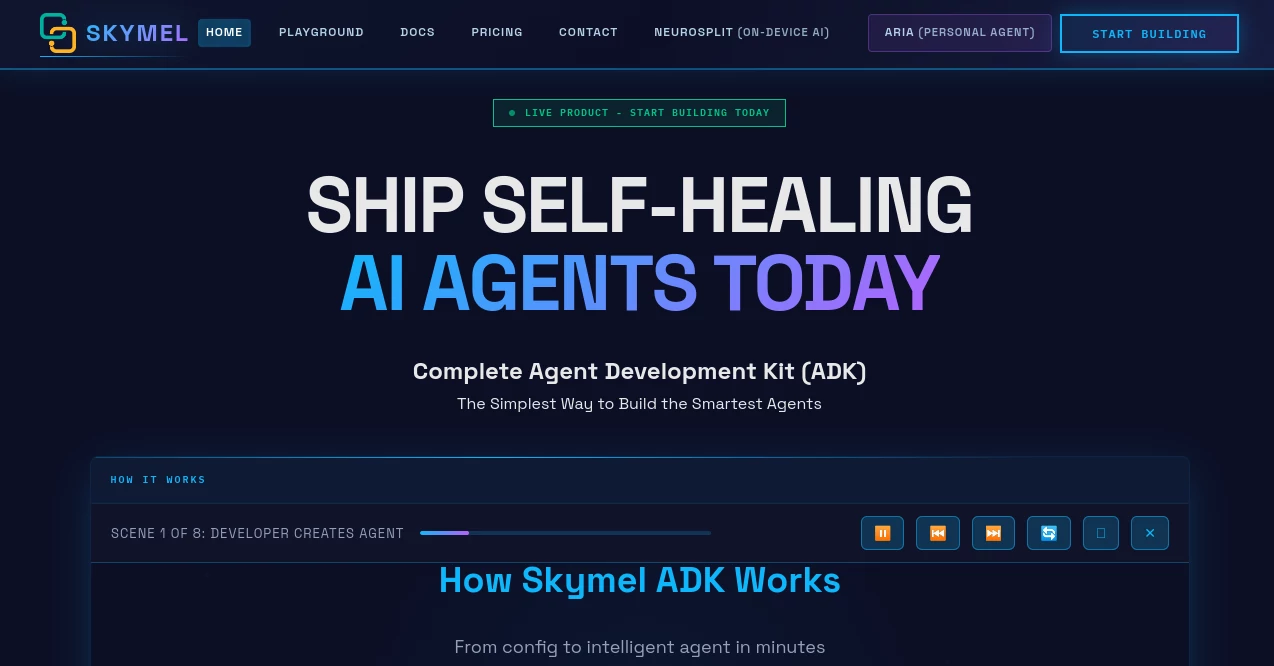🧠 AI Quiz
Think you really understand Artificial Intelligence?
Test yourself and see how well you know the world of AI.
Answer AI-related questions, compete with other users, and prove that
you’re among the best when it comes to AI knowledge.
Reach the top of our leaderboard.
Skymel
Build Smarter AI Agents Without the Code Hassle

What is Skymel?
Skymel hands developers a toolkit to whip up clever, self-fixing bots that handle real jobs without the usual headaches. Picture agents that spot their own slip-ups, tweak on the fly, and get sharper with each go-round, all sparked by a few plain words or a quick setup file. It's caught on quick among coders tired of wrestling flaky setups, letting them focus on big ideas instead of endless debugging.
Introduction
Skymel rolled out as a fresh take on agent building, born from the gripes of devs who'd spent too many nights chasing ghosts in language model chains. A small crew of tinkerers pieced it together to cut the fluff, and soon enough, it was pulling in users from startups to tech shops who needed bots that actually stuck the landing. What started as a beta playground has bloomed into a full kit, with stories floating around of teams slashing setup time by days and watching their creations evolve like living things. At its heart, it's about ditching the rigid scripts for something that bends with the task, turning what-if scenarios into reliable workhorses that pay off fast.
Key Features
User Interface
You jump in with a straightforward code snippet or a config tweak, no flashy dashboards to muddle things—just clean lines of JavaScript that feel like jotting a note. The live tester lets you poke at agents right there, watching outputs unfold in real time without a full rebuild. It's geared for folks who live in terminals, but the examples guide you gently, making the shift from idea to run feel like a casual stroll rather than a steep climb.
Accuracy & Performance
These agents don't just guess; they lean on a mix of brains to keep things grounded, hitting marks with a 94 percent success rate on tricky customer loops and clocking responses in about a second flat. Over runs, they sharpen up, dodging the wild drifts that plague simpler setups, so your outputs stay tight and true even as tasks pile on. Devs note how it handles the curveballs without breaking a sweat, keeping costs in check while delivering steady wins.
Capabilities
From sorting refunds in support chats to crunching data flows, it spins up plans on the spot using a smart graph that picks the right tools and steps for the job. You can layer in memory for context carryover or hook up external bits like databases, all while the system watches for hiccups and patches them mid-stride. It's built to scale from one-off tests to daily grinds, with learning loops that make each execution a step forward for the whole crew.
Security & Privacy
Keys lock down access from the get-go, and for bigger outfits, you can pull it all in-house to keep sensitive bits close. It sticks to basics like secure calls and no-nonsense data flows, giving you the reins on what sticks around or gets scrubbed. Teams like the peace of mind that comes from clear logs without the worry of leaks, letting them deploy bold without the back-of-mind jitters.
Use Cases
Support desks tap it for bots that field queries and fix tickets on the fly, easing the load on humans for routine gripes. Data wranglers use it to automate cleanups and pulls, turning messy feeds into neat insights without the manual slog. Workflow teams craft custom chains for everything from lead follows to report gens, adapting as rules shift. Even solo devs prototype quick helpers for personal projects, watching them grow smarter with minimal tweaks.
Pros and Cons
Pros:
- Sets up in lines of code, skipping the orchestration maze.
- Self-fixes glitches, cutting debug time to near zero.
- Scales smooth from trials to full blasts, with cost caps baked in.
Cons:
- Geared more for code-savvy folks than total beginners.
- Extra runs beyond basics add a small tab on lower plans.
- On-prem perks hide behind the custom pricing door.
Pricing Plans
The starter pack kicks off at twenty-five bucks a month, covering two hundred fifty workflow spins and a free first-month run on executions, with extras at a dime a pop. For the big leagues, enterprise chats custom rates that unlock unlimited plays, in-house setups, and hand-holding support. It's pay-what-you-use on the backend, so light testers stay cheap, and yearly nods could trim the edges if you commit.
How to Use Skymel
Grab the kit with a quick npm pull, slip in your key, and sketch your agent in words or a tidy JSON blob. Toss a task its way, like 'handle this refund mess,' and let it plot the path, picking models and hooks along the route. Watch the logs tick by, tweak if a snag shows, then push live with a single nod. Over time, feed it more runs to let the smarts build, circling back to refine as your needs wander.
Comparison with Similar Tools
Next to chain builders that demand page after page of glue code, Skymel slips in with a config or two, delivering full agents that run circles around frameworks alone. Where some lean heavy on one model type, it mixes them for sturdier results, though purists might miss the fine-grained reins. It carves out a spot for quick-to-prod needs, blending ease with punch where others tip toward setup or simplicity.
Conclusion
Skymel flips the agent game by making smart bots that mend themselves and grow with the grind, handing devs a kit that's as forgiving as it is fierce. It turns the dream of hands-off helpers into everyday reality, paving smoother paths for teams chasing automation without the anchors. As these digital sidekicks keep evolving, Skymel stays ahead, whispering that the future's not in more code, but in letting the machines steer a bit.
Frequently Asked Questions (FAQ)
Do I need fancy coding chops to start?
Nah, natural talk or basic JSON gets you rolling, though a dash of JS helps for tweaks.
How does it dodge the usual bot blunders?
A blend of models spots slips and reroutes, keeping things on track without your fix.
Can it handle my wild custom jobs?
Yep, plots fresh paths per task, hooking whatever tools you throw its way.
What's the learning curve like?
Quick for prototypes, deeper for prod tweaks, with examples to light the trail.
Any limits on how big it scales?
Starter caps at a few hundred runs, but enterprise goes wide open with your say.
AI No-Code & Low-Code , AI Developer Tools , AI Task Management , AI Workflow Management .
These classifications represent its core capabilities and areas of application. For related tools, explore the linked categories above.
Skymel details
This tool is no longer available on submitaitools.org; find alternatives on Alternative to Skymel.
Pricing
- Free
Apps
- Web Tools

















